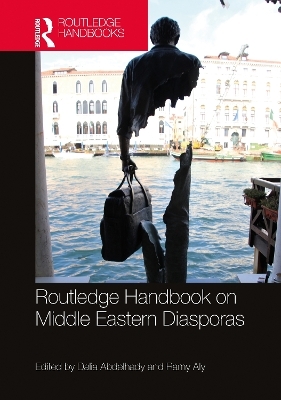
Routledge Handbook on Middle Eastern Diasporas
Routledge (Verlag)
978-1-032-30440-3 (ISBN)
Bringing together different strands of research on Middle Eastern diasporas, the Routledge Handbook on Middle Eastern Diasporas sheds light on diverse approaches to investigating diaspora groups in different national contexts.
Asking how diasporans forge connections and means of belonging, the analyses provided turn the reader’s gaze to the multiple forms of belonging to both peoples and places. Rather than seeing diasporans as marginalised groups of people longing to return to a homeland, analyses in this volume demonstrate that Middle East diasporans, like other diasporas and citizens alike, are people who respond to major social change and transformations. Those we count as Middle Eastern diasporans, both in the region and beyond, contribute to transnational social spaces, and new forms of cultural expressions. Chapters included cover how diasporas have been formed, the ways that diasporans make and remake homes, the expressive terrains where diasporas are contested, how class, livelihoods and mobility inflect diasporic practices, the emergence of diasporic sensibilities and, finally, scholarship that draws our attention to the plurilocality of Middle Eastern diasporas.
Offering a rich compilation of case studies, this book will appeal to students of Middle Eastern Studies, International Relations, and Sociology, as well as being of interest to policymakers, government departments, and NGOs.
Dalia Abdelhady is Associate Professor in the Department of Sociology at Lund University, Sweden. Her work features the application of postcolonial analysis to the sociology of migration. Following a comparative perspective, her work focuses on the meeting point between individual immigrants (and their communities) and institutions in receiving countries (such as schools, labour markets, media and political policies). In addition to a number of journal articles and book chapters, she is the author of The Lebanese Diaspora: The Arab Immigrant Experiences in Montreal, New York and Paris (2011), and co-editor of Refugees and the Violence of Welfare Bureaucracies in Northern Europe (2020). Ramy Aly is Assistant Professor of Anthropology at the American University in Cairo, Egypt. Ramy’s first monograph Becoming Arab in London: Performativity and the Undoing of Identity was published in 2015 with Pluto Press as part of their celebrated ‘Anthropology, Culture and Society Series’. The book is the first ethnographic account of gender, race and class practices among British-born and -raised Arabs in London and attempts to provide an account of the everyday experiences of Arabness in the British capital. Ramy’s research interests and publications engage with the anthropology of ethnicity, migration and diaspora; anthropology and media studies; cultural studies; and youth cultures.
1. Coming to and coming from the Middle East: the unfolding of diaspora, Part 1: Forming diasporas, 2. To be denied a homeland: British mandate policy and the making of the Palestinian diaspora in Chile, 3. The AKP government in Turkey and diaspora-making: lobbying, public diplomacy and the erasure of difference, 4. Critical events and the formation of a Coptic diaspora in North America between Al-Khanka and Al-Zāwiya Al-Hamrā, 5. Opportunities here and there: digital diasporas and the Iranian American election moment, 6. The limits of diaspora: double vulnerabilities among Eritreans in Saudi-Arabia, Part 2: Making and remaking homes, 7. The lifecycle of Amazigh diaspora activism in Europe: from institutional pioneers to the new ethnicities of the postmodern age, 8. The diasporic Amazigh movement in France: articulating indigeneity, 9. Valorising some and marginalising others: the diasporic field in the making of Lebanon, 10. Transnational networks in Tunisia’s democratization: Diaspora activism in France and Italy, 11. Secularism, sectarianism and the transnational connectivity of the Lebanese diaspora in Senegal, Part 3: Expressive terrains of contestation, 12. The semantics and substance of contesting Turkishness in the diaspora, 13. De-orientalising queer Iranian diasporic identities, 14. Queering diaspora through queer art: contesting the double binds of homocolonialism and homonationalism, 15. Post-tarab identities in diaspora: a sonic imaginary of Arab Canada, 16. Resisting marginalisation, renegotiating gender: intersectional narratives of diaspora experiences, 17. Creativity as a contested site of identity-making: careers, gender and diaspora for Sydney’s Lebanese Australians, Part 4: Class, livelihood and mobility, 18. Exploring the creative Israeli diaspora: reading class and profession in the diaspora, 19. Making middle class lives: diaspora and belonging among Pakistanis in Dubai, 20. Diasporic before the move: China’s Hui Muslim’s trade and ties with Iran and Muslimness, 21. A Diasporic Balancing Act: Syrian entrepreneurs in Turkey, Egypt and Jordan, 22. Diaspora Syrians and humanitarian aid in the Syrian civil war, Part 5: Diasporic sensibilities, 23. Return migration and repatriation: myths and realities in the interwar Syrian mahjar, 24. The emergence of diasporic sensibilities among Iraqis in London, 25. Healed pasts, multiple belongings and multi-focal engagements: a Danish-Palestinian diaspora tour, 26. Idioms of care: aging and connectivity among older Turkish migrants in Sweden, 27. The Egyptian Muslim Brotherhood in Turkey after the 2013 coup: organizational renewal and renegotiation in the diaspora, Part 6: Plurilocal diasporas, rethinking Mahjar, 28. The Hadrami diaspora: a plurilocal mahjar, 29. Hadrami connections with the Malay world: creole histories, transcultural Islam and racialisation, 30. Towards a new mode of reading Muslim diaspora writing: Muslimness and the homing desire in Abu-Jaber’s Crescent and Shafak’s The Saint of Incipient Insanities, 31. The Armenian Middle East: Boundaries, Pathways and Horizons, 32. Negotiating placemaking: private-public spaces and Hinduism in Oman
| Erscheinungsdatum | 23.04.2024 |
|---|---|
| Zusatzinfo | 8 Halftones, black and white; 8 Illustrations, black and white |
| Verlagsort | London |
| Sprache | englisch |
| Maße | 174 x 246 mm |
| Gewicht | 453 g |
| Themenwelt | Geschichte ► Teilgebiete der Geschichte ► Wirtschaftsgeschichte |
| Sozialwissenschaften | |
| ISBN-10 | 1-032-30440-5 / 1032304405 |
| ISBN-13 | 978-1-032-30440-3 / 9781032304403 |
| Zustand | Neuware |
| Haben Sie eine Frage zum Produkt? |
aus dem Bereich


